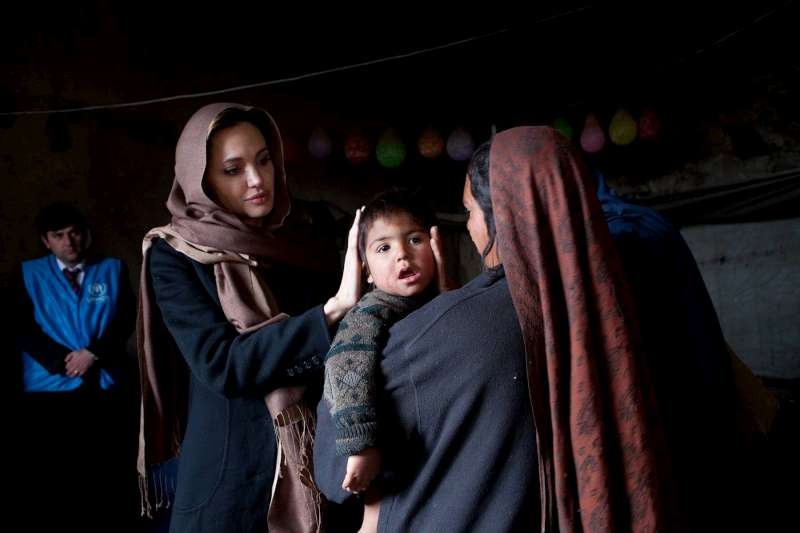Angelina Jolie urges more focus on reintegration for former Afghan refugees
Angelina Jolie urges more focus on reintegration for former Afghan refugees

KABUL, Afghanistan, March 2 (UNHCR) – UNHCR Goodwill Ambassador Angelina Jolie on Wednesday called for greater focus to be put on the reintegration of former Afghan refugees as she wrapped up her second visit to the western Asian nation.
During her two-day trip, the acclaimed actress met internally displaced people and refugee returnees still struggling to survive and reintegrate almost 10 years after returning to Afghanistan from years of exile.
More than 5.5 million refugees have returned since 2002, mainly from Pakistan and Iran, and now make up 20 per cent of the population. UNHCR is concerned that too many of these former refugees continue to live without jobs, shelter and other basic needs.
"It's clear travelling through the country that what needs to be done is a very focused approach in places of return. We need to revisit the idea of what return is and the difference between just returning and reintegrating," said Jolie, who last visited Afghanistan for UNHCR in 2008.
"The focus needs to be put now on reintegration, and that means not just putting up shelter but making sure there is water, job opportunities, a school for the children and medical clinics," she added.
On Wednesday, Jolie returned to visit families living in a dilapidated warehouse in Kabul that once served as a storage facility for the national bus company. The Tamir Mili Bus depot is now one of 30 UNHCR-identified sites in the Afghan capital where returned refugees and internally displaced people can live while they eke out a living.
The Goodwill Ambassador caught up again with Khanum Gul in the small damp room she shares with her husband and eight children. A UNHCR plastic tarpaulin covered a gaping hole in the front wall, providing some shelter from the wind and snow. On Jolie's first visit in 2008, Khanum had just given birth to her son Samir.
"It was very distressing to see that, because of the poor conditions, Samir seems to be suffering some form of developmental delay due to malnutrition or lack of medical care. He can't walk and is barely surviving in what can only be described as a very cold and damp warehouse," Jolie said.
Khanum's husband, Eshan, tries to earn a living as a daily labourer. He waits for hours every day but is rarely picked for work. The couple also support Khanum's ailing 70-year-old mother, Bi Bi Zamo Jan, who also met Jolie on her first visit.
"This old woman was so upset, because she feels like a burden. She watches her grandchildren go onto the streets every day to wash cars for a dollar a day so the family can eat. Often they earn nothing," Jolie said. "Everyone I have met on this visit has been very clear. The Afghan people don't want to become beggars. They want the opportunity to work for a living with dignity so they can provide for their families."
The day after arriving on Monday evening, the Goodwill Ambassador travelled to the village of Qala Gadu, which lies north of Kabul on the Shomali Plain, the scene of fierce fighting during successive waves of conflict in Afghanistan since the late 1970s. Among the 2,500 families in the area, almost everyone is a returned refugee or was internally displaced before 2002.
Jolie met a group of young girls who will study at a new primary school that is being built in the village with funding from the actress. She also paid for a school in the remote returnee settlement of Tangi in eastern Afghanistan's Nangarhar province. The girls in Qala Gadu currently study next to the local mosque. The lack of a proper classroom means most girls can't study beyond 4th Grade.
Ten-year-old Sahira presented Jolie with flowers on behalf of her classmates, saying: "If you build this school, I promise I will work really hard and study until the 12th Grade." Sahira, who wants to be a doctor when she grows up, is the youngest of five daughters and the first of them to attend school.
UNHCR is currently rallying support from donors and humanitarian and development agencies to redouble efforts to help returning refugees integrate in Afghanistan.
By Ariane Rummery in Kabul, Afghanistan
Donation Hotline: 2388 3278
Donation A/C : HSBC 502-393333-001
Donation by cheque:
Please make cheque payable to "UNHCR" and mail to 1/F, Eaton House, 380 Nathan Road, Kowloon, Hong Kong




